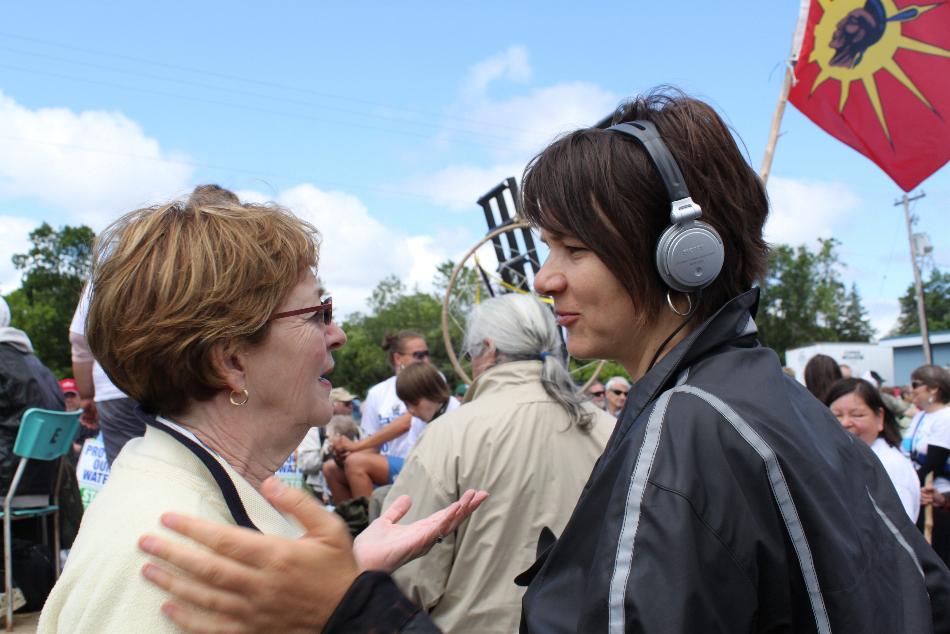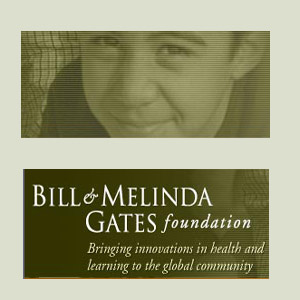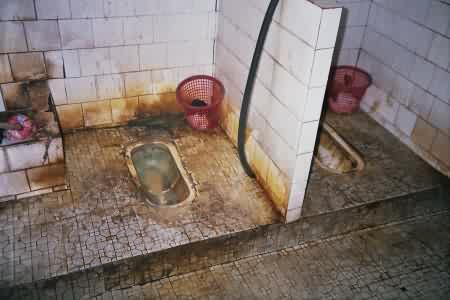Prepare briefing notes, talking points, and presentation drafts in preparation for key
Support briefing materials development for trip planning by foundation leadership
Analyze, synthesize, and present data in Excel as well as Stata, Matlab, or other
This position will provide opportunity for a wide range of experiences and professional
development.
Significant experience with the particulars of sanitation in developing countries is
a must. This may have been acquired in a number of ways including, but not
limited to, a technical degree in science field related to sanitation. Examples of
desirable qualifications include: Civil or environmental engineering, epidemiology,
microbiology, or environmental economics. Masters degree is highly desirable.
combine technical expertise with strong analytic and writing skills.
Experience in developing countries, particularly in Africa and Asia a plus.
Strong quantitative skills required including statistical analysis; not only the
presentation of data, but its synthesis and analysis, will be required.
facility in a fast paced work environment.
solve problems with high energy and a positive attitude.
A sense of humor.
online.
Position Title: Program Officer, Water Sanitation and Hygiene
Foundation Summary: Guided by the belief that every life has equal value, the Bill &
Melinda Gates Foundation works to help all people lead healthy, productive lives. In developing
countries, it focuses on improving people's health and giving them the chance to lift themselves
out of hunger and extreme poverty. In the United States, it seeks to ensure that all people—
especially those with the fewest resources—have access to the opportunities they need to
succeed in school and life. Based in Seattle, the foundation is led by CEO Jeff Raikes and cochair
William H. Gates Sr., under the direction of Bill and Melinda Gates and Warren Buffett.
Group Summary: The foundation's Global Development Program is working with
motivated partners to create opportunities for people to lift themselves out of poverty and
hunger. Within this program, the Water, Sanitation & Hygiene (WSH) initiative focuses its
efforts on supporting effective, sustainable and scalable ways to assist the 2.5 billion
people who lack access to adequate sanitation. Our grants fund both direct solutions,
such as user-led sanitation, as well as indirect levers, such as improved information on
costing to achieve sustainable service delivery. In all cases, we seek to catalyze action
by others and to leverage the foundation's particular capabilities, such as taking risks to
drive innovation and engaging with a wide range of partners to achieve measurable
results.
Position Summary and Responsibilities:
The WSH team is committed to the highest standards for evidence-based grantmaking,
rigorous reporting against strategic targets, and a transparent, iterative relationship
between our strategy, measurement plan, and execution plan for grantmaking. Our
approach to investing requires that we creatively develop results frameworks with our
grantees so that they can be held accountable for outputs and outcomes, not only
activities. It also requires that we understand for ourselves the opportunity cost of our
resources as deployed, the cost-effectiveness of the programs that we support, and
"what works" in water, sanitation, and hygiene so that we can continuously work to
increase our impact.
The Program Officer (PO) will support WSH team leadership in making this vision for the
WSH team a reality. The PO will:
Manage and make grants that to measure impact and rigorously test alternative
means of providing sanitation services.
Support the use of measurement and evidence in strategy refinement, reporting,
and advocacy
Support the use of outcome-based metrics for grantee reporting
The PO reports to a senior colleague with extensive experience doing and managing
impact evaluations and program evaluations and will work closely with the director and
other team members closely engaged with strategy development.
The PO will be given the flexibility to maintain a professional profile academically, with
time for independent research made available (up to 10% of time).
Specific responsibilities will include:
Make grants, and analyze results from these grants, in order to sharpen the WSH
team strategy and our ability to report on progress and value for money.
Determining, with team leadership, evaluation priorities, objectives, scope, and
preferred methodology.
Develop strategies and workable plans for using measurement to inform strategy and
reporting on opportunity cost and cost-effectiveness of WSH investment portfolio.
Developing creative and rigorous results frameworks for grantees that allow outputs
and outcomes to be measured and monitored, not only the expenditure of money
and implementation of activities.
Contribute to the larger measurement community of practice at the foundation.
Maintain an active role in the larger field of impact evaluation in both the academic
and policy worlds and function as an effective advocate for evidence based
approaches to WSH financing and development funding more generally.
Supporting the thoughtful use of evaluation methods beyond randomized trials and
other quantitative methods, including outcome mapping and process evaluation, for
grantees and clusters of grantees.
Research and analysis to report out on learnings and policy implications for the WSH
sector.
Qualifications:
• Advanced degree in economics or related quantitative social science or public health
discipline (e.g., epidemiology, public policy, political science) required; PhD strongly
preferred.
• Content area expertise in WSH desired but expertise in related areas (e.g., health or
urban economics, public finance, determinants of technology adoption, the
economics of R&D) may be sufficient.
• Expertise and experience in the area of rigorous measurement and evaluation,
including econometrics, strongly preferred.
• Thorough familiarity with logic models, logical frameworks, or similar devices for
framing strategic objectives, articulating key assumptions, and articulating results
important.
• The ideal candidate will have a creative and rigorous bent that allows the deployment
of multiple other tools for assessing impact such as outcome mapping, if not actual
experience with other approaches.
• 7-10 experience working in development and/or evaluation.
• At least several years professional experience in developing countries.
• Strong communication and facilitation skills.
• Ability to work as part of a team with flexibility, efficiency, enthusiasm, and diplomacy
both individually and as part of a complex program.
• Ability to travel up to 25% of time.
• Sense of humor.
If you are interested in applying for this position, please visit
online.
***********
NRDC Water Policy Analyst
![]()
![]()
Salary: Salary is based on a nonprofit scale and commensurate with experience.
Education: Master (MA, MSW, etc.)
Location: Santa Monica, California, 90401, United States
Posted by: Natural Resources Defense Council (NRDC)
|
Job Category: Advocacy, Public Policy
Sector: Nonprofit
Last day to apply: December 10, 2010
Last updated: November 18, 2010
| Type: Full time
Language(s): English
Job posted on: November 18, 2010
Area of Focus: Environment and Ecology, Urban Affairs |
Description:
The Natural Resources Defense Council (NRDC) is a non-profit national environmental organization with more than 1.2 million members and online activists. We have offices in New York, Washington, D.C., San Francisco, Santa Monica, Chicago, and Beijing. Our staff of over 300 includes attorneys, scientists, policy analysts, and educators working to protect the environment and public health through advocacy and education.
NRDC's new national Water Program focuses on securing safe and sufficient water for humans and ecosystems in the face of existing and emerging threats. The program involves staff in all of NRDC's U.S. offices and fully integrates our water resources work so that it addresses water supply and water quality, surface water and groundwater, human health and ecosystem issues. The Program's staff is organized into four teams focusing on Green Infrastructure, Water Use Efficiency, Water & Climate, and developing a new water paradigm in California. The four program teams work together to implement a portfolio of strategies that maximize efficiency and minimize waste, prevent pollution, and protect and restore the ecosystem.
Position Summary:
NRDC has an immediate opening for a Water Policy Analyst who will work closely with the director of the Water Efficiency Team. The position will be based in NRDC's Santa Monica office. This person will play an important role in formulating and implementing NRDC's efforts to advocate for improved water use efficiency and water recycling in California and nationally, and will collaborate with a team of attorneys and other staff engaged in these issues.
Essential Functions:
Serve as NRDC's representative in a variety of state and federal regulatory, administrative, and collaborative forums, advocating improvements in water use efficiency and water recycling. Conduct analyses, manage databases, and research and write NRDC reports and media kits on key water efficiency topics and policies. Review and comment on water conservation programs, draft legislation, agency reports, draft rules, etc. Responsibilities include contact with regulatory agencies, the media, and legislative offices.
The job will include:
1. Review and analysis of current state and federal water conservation programs, and evaluation of costs and benefits of new water efficiency initiatives
2. Legislative advocacy on water efficiency and water recycling
3. Promoting increased integration of water and energy policy and planning
4. Advocating at the state and national level for product standards, model building codes, and other regulations that improve water use efficiency
5. Pursuing implementation of water efficiency and water recycling as means to reduce global warming emissions as well as to adapt to the impacts of global warming
6. Advocating for improved agricultural water use efficiency
7. Supervising the work of contractors and interns
Skills & Knowledge Requirements:
• Advanced degree in engineering, water resources, public policy, law, or a related subject
• Minimum of 3 years work experience in the field or a related one
• Familiarity with spreadsheets and similar tools for quantitative analysis and data management
• Knowledge of water efficiency, conservation, and reuse
• Strong advocacy experience on environmental issues
• Excellent oral and written communication skills
• Experience in building collaborations with non-traditional allies
• Strong interpersonal skills
NRDC offers competitive salaries, excellent benefits, and a dynamic work environment, and we are committed to workplace diversity. Salary is based on a nonprofit scale and commensurate with experience. For further information about NRDC, please visit
nrdc.org.
How to Apply:
To apply, please visit
www.nrdc.org/jobs. Please apply no later than December 10, 2010. No phone calls or faxes. Please reference where you saw this posting. NRDC is an Equal Opportunity Employer.
******




















